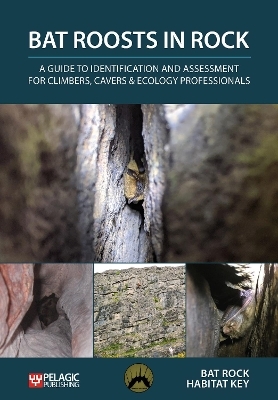
Bat Roosts in Rock
A Guide to Identification and Assessment for Climbers, Cavers & Ecology Professionals
Seiten
2021
Pelagic Publishing (Verlag)
978-1-78427-261-6 (ISBN)
Pelagic Publishing (Verlag)
978-1-78427-261-6 (ISBN)
This guide provides descriptions of when the species of bats resident in British and Ireland use natural and man-made rock habitats, how they use them, and the environment each species occupies within them. This data is part of the Bat Rock Habitat Key project.
This guide provides descriptions of when the bat species resident in Britain and Ireland use natural and human-made rock habitats, how they use them, and the environments each species occupies therein. For the first time it brings together findings from historical scientific investigations, useful photographic accounts and open-access biological records, along with a rich seam of new data – all in a practical and user-friendly structure. The book encompasses:
~ Descriptions of the features that a climber, caver or professional ecologist might encounter on and in rock habitats where bats roost.
~ Recording criteria for both the physical and environmental attributes of different features and situations.
~ Identification of suitability thresholds against which the recorded information can be compared to assess the likelihood that a specific feature might be exploited by a particular bat species.
~ Suggestions for how to avoid mistakes and difficulties when performing a survey.
The intention is that using this book will help generate standardised biological records which can feed into the fully accessible online database at www.batrockhabitatkey.co.uk. These data will be analysed to search for patterns that can increase the confidence in the suitability thresholds and help build roost features that deliver the environment each species really needs. As well as offering many new insights, this book allows the reader to participate in cutting-edge research.
This guide provides descriptions of when the bat species resident in Britain and Ireland use natural and human-made rock habitats, how they use them, and the environments each species occupies therein. For the first time it brings together findings from historical scientific investigations, useful photographic accounts and open-access biological records, along with a rich seam of new data – all in a practical and user-friendly structure. The book encompasses:
~ Descriptions of the features that a climber, caver or professional ecologist might encounter on and in rock habitats where bats roost.
~ Recording criteria for both the physical and environmental attributes of different features and situations.
~ Identification of suitability thresholds against which the recorded information can be compared to assess the likelihood that a specific feature might be exploited by a particular bat species.
~ Suggestions for how to avoid mistakes and difficulties when performing a survey.
The intention is that using this book will help generate standardised biological records which can feed into the fully accessible online database at www.batrockhabitatkey.co.uk. These data will be analysed to search for patterns that can increase the confidence in the suitability thresholds and help build roost features that deliver the environment each species really needs. As well as offering many new insights, this book allows the reader to participate in cutting-edge research.
Bat Rock Habitat Key is the sister project to Bat Tree Habitat Key and is another altruistic collaborative project, set up by Henry Andrews, that has been running since 2018. The project objective is to provide evidence-supported accounts of how each bat species resident in the British Isles exploit rock environments as roost sites. This is achieved by data review, collection and analysis within a standardised framework, as well as the collection of photographic accounts which may be contributed to by anyone and are made publicly available for everyone. The project website, data review, analysis and publication are funded by the sale of this book.
| Erscheinungsdatum | 20.08.2021 |
|---|---|
| Reihe/Serie | Bat Biology and Conservation |
| Zusatzinfo | 61 Tables, unspecified; 167 Illustrations, color |
| Verlagsort | Exeter |
| Sprache | englisch |
| Maße | 170 x 244 mm |
| Gewicht | 760 g |
| Themenwelt | Naturwissenschaften ► Biologie ► Ökologie / Naturschutz |
| Naturwissenschaften ► Biologie ► Zoologie | |
| ISBN-10 | 1-78427-261-2 / 1784272612 |
| ISBN-13 | 978-1-78427-261-6 / 9781784272616 |
| Zustand | Neuware |
| Haben Sie eine Frage zum Produkt? |
Mehr entdecken
aus dem Bereich
aus dem Bereich


